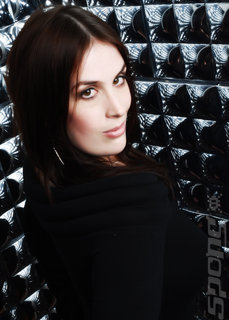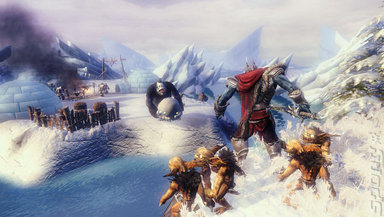Q&As// Rhianna Pratchett, Overlord II Screen Writer
We tried and failed to put across in the first game
Companies:
Codemasters Electronic Arts Ninja Theory
People: Rhianna Pratchett
Games: Overlord II Mirror's Edge Heavenly Sword (PS3) Overlord
People: Rhianna Pratchett
Games: Overlord II Mirror's Edge Heavenly Sword (PS3) Overlord
Most gamers who've ever played anything other than a sports sim will tell you that good story telling is important to games. Most games professionals will agree with them. Despite that, the industry is still getting to grips with exactly how to deal with narrative. Screen writing for games is an art that remains mysterious and elusive, with those attempting it reporting wildly different approaches.
Elusive or not, Rhianna Pratchett has been at the craft for a while now, having worked on, among others Heavenly Sword, Mirror's Edge, Overlord and, most recently, it's sequel.
SPOnG caught up with her to discuss the upcoming game, the writing process and whether cutscenes should roll face down into the gutter and stop bothering us.
SPOnG: We'll start with Overlord II, since it's not too far from release. You've said that you didn't get brought in at the start for the first one. Were you brought in earlier, this time around? If so, how do you feel the game's benefited from having a writer at an earlier stage? (Don't be modest).
Rhianna Pratchett: Although I wasn’t brought on board right at the beginning for the first Overlord, Triumph had left more than enough room for narrative, so it wasn’t a problem. I actually worked on the project for about a year and a half.
With Overlord II I was there from the start, helping brainstorm stuff with Lennart Sas (the Creative Director) and Codemasters and putting together the main characters, story arch and beats. I really think it benefited from focusing on narrative right from the off. It’s certainly a stronger story for it and feels more cohesive than the first game. A large part of that is just because the whole team were more familiar with the narrative of the world.
SPOnG: Games writers often report quite different processes for writing a game. How did you and Triumph work together on Overlord II?
Rhianna Pratchett: Writing for games is certainly a really unique story creation process and experiences can vary wildly from project to project. As far as Triumph goes, we’d built up a great working relationship on the original game and Raising Hell, so the whole team had been in the trenches together. I think we had a much clearer idea of what we wanted to do differently in the sequel and we all knew each other pretty well.
As I mentioned above, there was a lot of narrative brainstorming at the start and putting that in place over the levels. Then it was all about working with the individual designers to hone each level script so it met both the needs of gameplay and the needs of narrative. One of the great things about working with Triumph is that I had complete access to the entire team. Messengers and file conversion repos(itary) also made my job a lot easier because even though I wasn’t on site that much, I could see all the relevant documents and talk to anyone I needed to.
There was also a lot of Red Bull sugar free and the occasional cookie involved.
SPOnG: We've been told by Codemasters that the feedback from the first game suggested gamers wanted it to be more evil. Did you get to have fun with that?
Rhianna Pratchett: We tried (and failed) to put across in the first game that deciding to help someone was more of a Machiavellian act, rather than a beneficent one. But I don’t think we executed it well enough and it wasn’t properly tied into the gameplay. It was interesting to see that lots of players gravitated towards being good/less evil, given the choice. It was reassuring about human nature, but not really Overlordy enough.
Addressing that was a core objective of Overlord II which is why we introduced the Tyranny system. Through this players can follow the path of destruction (crush, kill and destroy, which equals a big quick pay off) or the path of domination (enslave everyone and have them work for you, which is more of a smaller sustained pay off.) Or they can mix and match. Linking it into the gameplay works really well and gives a great sense of the different shades of evil. It’s hugely good fun.
I think Overlord II as a whole was a little bit more fun to write for. A lot of this had to do with things like the Overlad section, where you play the Overlord as a young boy, the multiple Mistresses (you can have three at once, although one of them is ‘changeable’ shall we say) and the introduction of more Minion characters. The antagonists were also really good fun. We’ve got some fantastic voice actors as well and VO sessions were a blast.
Elusive or not, Rhianna Pratchett has been at the craft for a while now, having worked on, among others Heavenly Sword, Mirror's Edge, Overlord and, most recently, it's sequel.
SPOnG caught up with her to discuss the upcoming game, the writing process and whether cutscenes should roll face down into the gutter and stop bothering us.
SPOnG: We'll start with Overlord II, since it's not too far from release. You've said that you didn't get brought in at the start for the first one. Were you brought in earlier, this time around? If so, how do you feel the game's benefited from having a writer at an earlier stage? (Don't be modest).
Rhianna Pratchett: Although I wasn’t brought on board right at the beginning for the first Overlord, Triumph had left more than enough room for narrative, so it wasn’t a problem. I actually worked on the project for about a year and a half.
With Overlord II I was there from the start, helping brainstorm stuff with Lennart Sas (the Creative Director) and Codemasters and putting together the main characters, story arch and beats. I really think it benefited from focusing on narrative right from the off. It’s certainly a stronger story for it and feels more cohesive than the first game. A large part of that is just because the whole team were more familiar with the narrative of the world.
SPOnG: Games writers often report quite different processes for writing a game. How did you and Triumph work together on Overlord II?
Rhianna Pratchett: Writing for games is certainly a really unique story creation process and experiences can vary wildly from project to project. As far as Triumph goes, we’d built up a great working relationship on the original game and Raising Hell, so the whole team had been in the trenches together. I think we had a much clearer idea of what we wanted to do differently in the sequel and we all knew each other pretty well.
As I mentioned above, there was a lot of narrative brainstorming at the start and putting that in place over the levels. Then it was all about working with the individual designers to hone each level script so it met both the needs of gameplay and the needs of narrative. One of the great things about working with Triumph is that I had complete access to the entire team. Messengers and file conversion repos(itary) also made my job a lot easier because even though I wasn’t on site that much, I could see all the relevant documents and talk to anyone I needed to.
There was also a lot of Red Bull sugar free and the occasional cookie involved.
SPOnG: We've been told by Codemasters that the feedback from the first game suggested gamers wanted it to be more evil. Did you get to have fun with that?
Rhianna Pratchett: We tried (and failed) to put across in the first game that deciding to help someone was more of a Machiavellian act, rather than a beneficent one. But I don’t think we executed it well enough and it wasn’t properly tied into the gameplay. It was interesting to see that lots of players gravitated towards being good/less evil, given the choice. It was reassuring about human nature, but not really Overlordy enough.
Addressing that was a core objective of Overlord II which is why we introduced the Tyranny system. Through this players can follow the path of destruction (crush, kill and destroy, which equals a big quick pay off) or the path of domination (enslave everyone and have them work for you, which is more of a smaller sustained pay off.) Or they can mix and match. Linking it into the gameplay works really well and gives a great sense of the different shades of evil. It’s hugely good fun.
I think Overlord II as a whole was a little bit more fun to write for. A lot of this had to do with things like the Overlad section, where you play the Overlord as a young boy, the multiple Mistresses (you can have three at once, although one of them is ‘changeable’ shall we say) and the introduction of more Minion characters. The antagonists were also really good fun. We’ve got some fantastic voice actors as well and VO sessions were a blast.
Companies:
Codemasters Electronic Arts Ninja Theory
People: Rhianna Pratchett
Games: Overlord II Mirror's Edge Heavenly Sword (PS3) Overlord
People: Rhianna Pratchett
Games: Overlord II Mirror's Edge Heavenly Sword (PS3) Overlord




